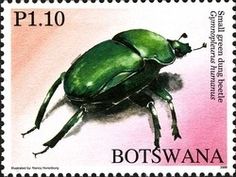New research led by scientists at the University of Bristol has uncovered that long-term use of some pesticides to treat cattle for parasites is having a significantly detrimental effect on the dung beetle population. Researchers studied 24 cattle farms across south west England and found that farms that used certain pesticides had fewer species of dung beetle. Dr Bryony Sands, from the University's School of Biological Sciences, who led the research, said: "Dung beetles recycle dung pats on pastures, bringing the nutrients back into the soil and ensuring the pastures are fertile. "Damage to dung beetle populations is therefore concerning, and could result in economic loss for farmers."
This is the first landscape-scale study to show that long-term use of the pesticides has negative impacts on dung beetle populations on farms. Professor Richard Wall, a co-author on the study, first discovered 30 years ago that pesticide residues in dung could kill these important beetles. Dr Sands added: "It is now clear that long-term use of these pesticides could cause declines in beetle biodiversity on a large scale."
The study, published in the journal Agriculture, Ecosystems & Environment, also found that pesticides known as synthetic pyrethroids were less damaging to dung beetles than macrocyclic lactone pesticides. These are generally thought of as a safer alternative for farmers who want to protect biodiversity on their farms.
Dr Sands said: "Although these chemicals do appear to be less damaging, farms that used them still had a smaller proportion of certain dung beetles, which are very important in removing dung from pastures by burying it. "The conservation of dung beetles is vital for the health and future sustainability of our farmland. Biodiversity losses such as these could result in loss of the services dung beetles provide to our ecosystems: dung decomposition, nutrient cycling, soil fertility and the preventing disease transmission."
Dr Sands and her colleagues hope the findings of the study will go some way to inform farmers about the negative impacts of these pesticides - some of which now have specific warnings labels on the bottles.
Source: EurekAlert, 9 July 2018
https://www.eurekalert.org/pub_releases/2018-07/uob-ltu070918.php

- Login om te reageren
